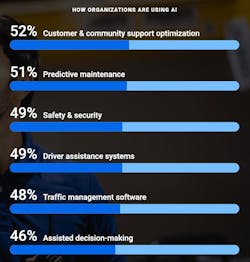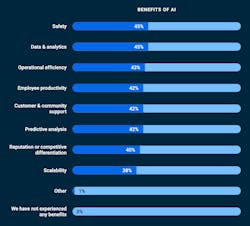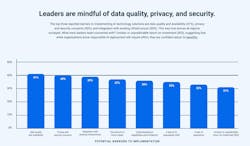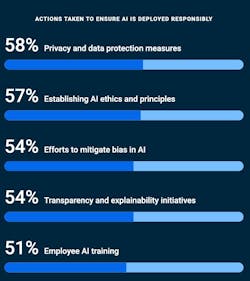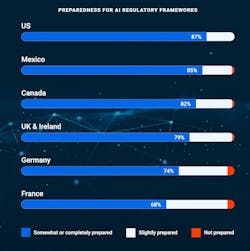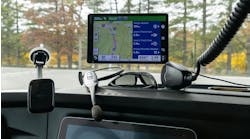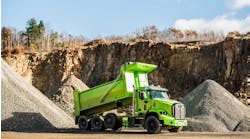What are fleet leaders saying about artificial intelligence integrations within their operations? Are any fleets currently experimenting with AI, and if so, where? These are all questions Samsara, a physical operations technology company, sought to answer from a survey for its latest State of Connected Operations Report.
More than 1,550 fleet leaders were surveyed across seven countries to understand where the industry stands with AI integrations. The results were compiled into Samsara’s report, Smarter, Faster, Safer: The AI Revolution in Physical Operations. The leaders surveyed by Samsara consisted of executives and directors of physical operations companies with 150 vehicles or more.
The report’s main findings outlined where fleets are using AI today, the benefits of AI within fleet operations, and what fleets can expect from AI in the future.
See also: Unlocking AI’s complex interpretations to increase efficiency and productivity
Where fleets use AI today
While a staggering 93% of respondents predict they will use AI by 2026, more than half (51%) of those surveyed are using artificial intelligence in their operations today, according to survey results. Among the 51% using AI, only 32% of leaders consider its use to be “widespread” in their organization.
Most AI usage is in the “early maturity stage” at these companies and fleets, the report stated, as 39% of leaders consider their usage to be limited to a few departments and employees, 20% consider their usage in the piloting stage with tests on specific use cases, and 6% haven’t even begun to use AI solutions, according to the survey.
Much of the use of AI is found in areas with a potential for "clear ROI,” said Evan Welbourne, Samsara’s head of AI and data. And survey results found the areas with the highest AI implementations in customer services and support, predictive maintenance, and safety.
Survey results indicate that, of all countries represented in the survey, Mexico is the leader in “widespread” AI adoption within the organization.
“Technology is a huge lever for these Mexican companies in addressing their safety and security issues,” Welbourne told FleetOwner, addressing cargo theft, hijacking, and driver kidnapping. “I think [AI adoption has] really been driven by necessity in Mexico. They just need solutions to these problems that are serious pain points.”
Benefits of AI in fleet operations
Fleet leaders are focused on integrating AI into their operations responsibly, the report stated. But this behavior doesn’t surprise Welbourne. Welbourne said fleet leaders are typically cautious when integrating any new technology within the fleet.
“Our customers are already working in a very highly regulated industry,” Welbourne explained. “Safety and security are top of the list. And the default, I think, is to begin with that caution and that more responsible approach.”
Integrating new technology into a fleet’s operations also requires time and money, and, as Welbourne mentioned, it’s important to see a clear ROI. Fleets are finding that ROI when integrating AI into website chatbots to help answer customers’ questions about the website or respond to sales questions.
This type of AI integration is “easy to plug in and have an impact,” Welbourne said. “You can get an immediate bang for your buck just by plugging it in.” This type of integration not only allows customers to receive answers immediately but also frees up office staff to work on other projects.
See also: How AI is making fleets more efficient
Other benefits fleets have found with AI integrations include improved safety (45%) and improved employee productivity (42%), according to the report. Survey respondents also referenced data and analytics (45%) and operational efficiency (43%) as benefits to using AI.
Not only are fleet leaders seeing improvements in operations, but they also indicated a strong employee buy-in, with 95% of U.S. respondents, 92% of French respondents, and 91% of Canadian respondents saying their employees feel positive about using the technology.
The future of AI in fleet operations
While this survey’s results point to a promising future for AI in the fleet space, there are still challenges keeping fleet leaders from adopting the new technology on a larger scale. These include data quality and availability (41%), privacy and security concerns (40%), and integration with existing infrastructure (39%), according to the survey.
But those barriers aren’t keeping fleet leaders from adopting AI technology; instead, they’re preparing for it, setting company standards, strengthening their security, and making efforts to eliminate bias in AI, among others.
An additional concern, or an aspect of AI integration that remains top of mind for fleet leaders, is the potential for regulatory changes with AI. However, most fleet leaders in the U.S. (87%) believe they are prepared for the implementation of AI regulatory framework. Fleet leaders in Mexico (85%) and Canada (82%) indicate they are the second and third-most prepared for AI regulatory framework.
See also: AI: On the road to limitless potential
AI is far from reaching its full potential, but it has come far within the past few years. In the next five years, fleet leaders most expect AI to benefit fleet supply chain resource management (41%), driver behavior and safety analytics (40%), and risk mitigation (38%). But Welbourne predicts AI could advance even more.
“Even just in the last year, we've seen these huge advances in AI,” Welbourne said. “My prediction is that in the next few years, we're going to start to see more specialized models that are really tailored to fleets. Then you can think of them as intelligent assistants that know everything about your fleet.
“They'll be able to surface answers to questions or insights using data capabilities that are totally specific to your fleet and then automatically optimize things,” Welbourne continued. “It will be very easy in the future to get those benefits from AI, and it'll be across a variety of use cases.”

